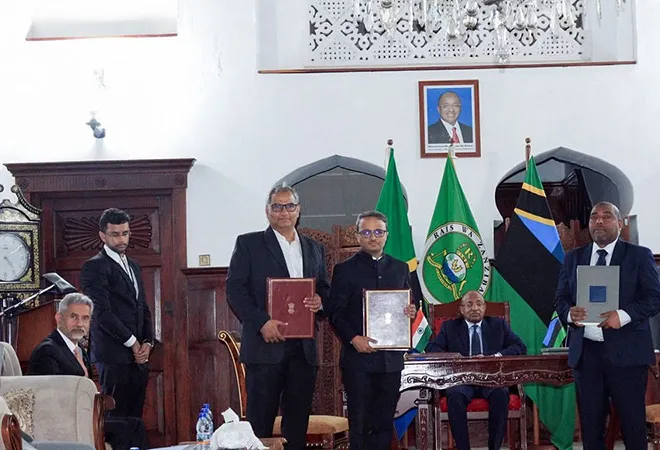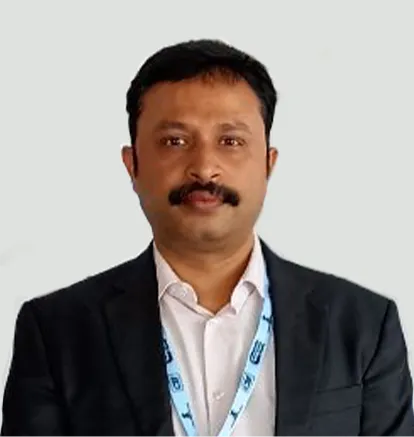-
CENTRES
Progammes & Centres
Location
India’s efforts to bring world-class education to Africa can have far-reaching impacts. It will boost local economy, attract investments and foster a culture of innovation.

During his recent four-day visit to Tanzania, External Affairs Minister S Jaishankar unveiled the first overseas Indian Institute of Technology campus in Zanzibar. The Memorandum of Understanding signed with the archipelago’s government marks a new historical high for India’s knowledge diplomacy with Africa and demonstrates the country’s commitment to fostering educational links as part of its initiative to work with emerging economies for converging ambitions.
The agreement essentially formalises the cooperative educational relationship between India and Tanzania and offers a framework for setting up the campus. It has been decided that in addition to developing the pedagogical elements, IIT-Madras will also be responsible for the academic programmes, curricula, and criteria for selecting students. The capital and operating costs will be covered by the government of Zanzibar-Tanzania, reflecting a fully demand-driven approach. Students enrolled in the campus will get their degrees from IIT-Madras.
Under the name IIT Madras at Zanzibar, the facility is anticipated to begin offering programmes this October with a batch of 50 undergraduate and 20 master’s students.
The capital and operating costs will be covered by the government of Zanzibar-Tanzania, reflecting a fully demand-driven approach.
This is the second prestigious Indian institution of higher learning to set up its operation in the African continent this year. India’s National Forensic Sciences University (NFSU) had its first overseas campus inaugurated by Jaishankar in Jinja, Uganda, in April. The campus was set up in collaboration with the Ugandan People’s Defence Forces and will offer courses in forensic sciences, behavioural sciences, cyber security, digital forensics, and allied sciences while also promoting research in these areas.
Although the discussions for the NFSU campus were going on for quite some time, it was only after Ugandan President Yoweri Museveni sent a letter to Prime Minister Narendra Modi in August 2022 requesting urgent action that the process gained momentum.
With Africa’s aspiration curve rising, New Delhi is capitalising on its potential by taking its relationship with the continent in higher education and skill development to the next level with world-class higher education institutions and global education brands like IITs and IIMs. India is using a demand-driven approach that focuses on country-level needs and priorities.
India’s National Education Policy (NEP) 2020 strongly recommends the internationalisation of Indian education and encourages top-performing Indian universities to establish campuses abroad. Indeed, these overseas campuses would help provide state-of-the-art programmes to students from Tanzania, Uganda, and other African nations. It also aligns with India’s objective to help African students achieve their educational goals and further the continent’s technological advancement.
Although overseas centres of Indian universities were only set up in Africa this year, building capacities and developing skills have always been key aspects of India’s engagement with the continent. The India Technical and Economic Cooperation (ITEC), which was launched in 1964, has been a crucial component of the cooperation between India and Africa. The continent is now the largest recipient of the ITEC programme, which is a tailored training programme based on the project country’s micro-level needs.
Realising the programme’s potential, India implemented a cotton technical assistance programme (C-TAP) in 2012 for Benin, Burkina Faso, Chad, and Mali.
The ITEC Executive programme, established in 2018, provides training, workshops, study and experience exchange visits to policymakers and senior-level functionaries from partner nations with the aim of providing them with an understanding of Indian governance innovations.
e-ITEC courses have evolved with time, with choices ranging from Big Data Analytics, urban infrastructure management, WTO-related subjects, and solar technology.
The programmes and delivery methods of ITEC have also evolved. For example, in 2019, India introduced online e-ITEC courses. Since the pandemic, e-ITEC courses have evolved with time, with choices ranging from Big Data Analytics, urban infrastructure management, WTO-related subjects, and solar technology. India also launched programmes similar to ITEC, such as the Special Commonwealth Assistance for Africa Programme (SCAAP) and the 1951 Colombo Plan Technical Cooperation Scheme (TCS).
The Pan African e-Network Project (PANEP), conceived by late President APJ Abdul Kalam and formally launched in 2009, has immensely contributed to the development of tele-education and telemedicine in Africa. The project was commissioned in 47 countries that signed an agreement with Telecommunications Consultants India Limited to participate. Over the past six years, seven IT centres have been established in South Africa, Egypt, Morocco, Lesotho, Ghana, Namibia, and Tanzania, as well as a geo-informatics centre for rural development in Madagascar and Niger.
Like ITEC, the PANEP has helped establish India’s reputation as a natural partner for Africa. In 2019, following the success of PANEP, e-VBAB (e-Vidyabharati and e-Arogya Bharati) was introduced.
In 2005, India became the only Asian country in the African Capacity-Building Foundation (ACBF), to commit $1 million for poverty alleviation and sustainable development. During the third India-Africa Forum Summit in 2015, India pledged 50,000 scholarships for African students to pursue their studies in India.
Currently, India features among the top five overseas destinations for Kenyan students. About 25,000 African students are currently studying in 500 different universities in India.
With its growing appetite for consumption as well as capital absorption, Africa has emerged as a new centre of growth for the world. During the last two decades, some African countries such as Ethiopia and Rwanda have witnessed rapid expansion, to the tune of 7.5 per cent a year. With a median age of 19, Africa has the youngest population in the world.
Yet, the number of people who have never attended school continues to rise. Africa is yet to achieve the globally “optimal” structure of educational accomplishment, which occurs when most of the country’s population has completed high school and acquired basic workforce skills.
Whether or not the next decade is Africa’s will be determined primarily by how the continent’s leaders handle the demographic dividend.
India’s efforts to bring world-class education to Africa can have a far-reaching impact on the continent. Access to the best education opportunities and facilities will pave the way for a brighter future for students across the continent. Moreover, this will positively impact the local economy, attracting investments and fostering a culture of innovation and entrepreneurship.
After the sluggish growth of the past few years due to the pandemic, the economies of many African countries are ramping up again. There is a need for African youth to have the opportunities to learn skills for new-age jobs shaped by increased digitisation and demand for resilient supply chains.
Furthermore, unless there is a more substantial commitment to improving the citizens’ abilities through skill upgrades, African nations risk slipping behind in the fourth industrial revolution. From ITEC to IIT, India is demonstrating that it is ready to be a reliable long-term partner of the continent.
This commentary originally appeared in ThePrint.
The views expressed above belong to the author(s). ORF research and analyses now available on Telegram! Click here to access our curated content — blogs, longforms and interviews.

Professor Harsh V. Pant is Vice President – Studies and Foreign Policy at Observer Research Foundation, New Delhi. He is a Professor of International Relations ...
Read More +
Samir Bhattacharya is an Associate Fellow at ORF where he works on geopolitics with particular reference to Africa in the changing global order. He has a ...
Read More +